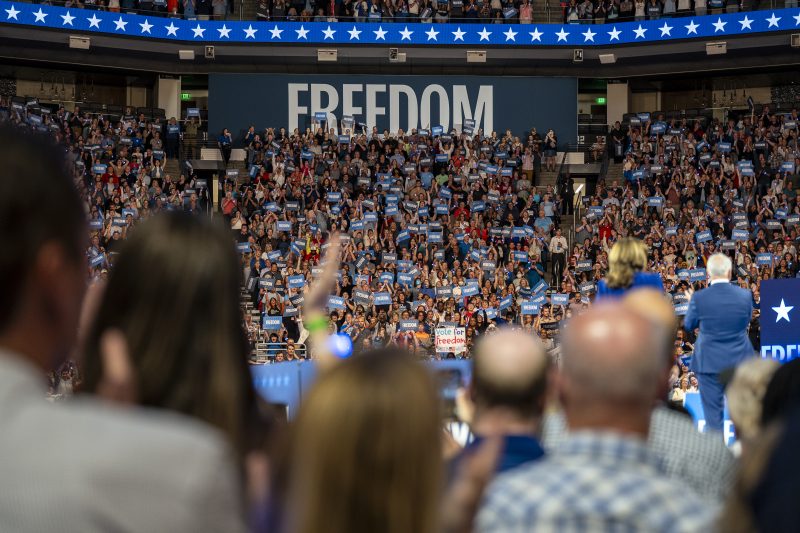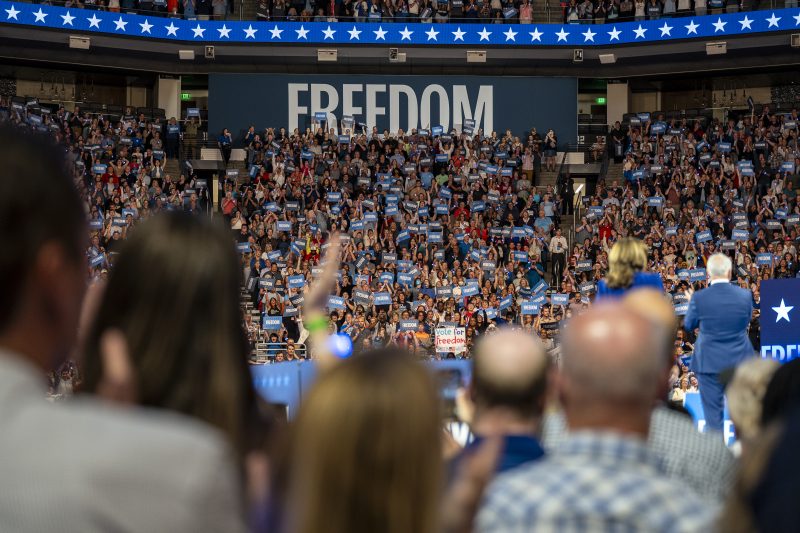
CHICAGO — When President Joe Biden delivered his valedictory address at the Democratic National Convention on Monday night, he invoked the need to “preserve our democracy,” “vote for democracy,” and confront the “clear and present threats to our very democracy.”
“We saved democracy in 2020,” he declared, “and now we must save it again in 2024.”
The theme of existential stakes for the American experiment was in keeping with one that Biden has hammered throughout the campaign. But his rhetorical emphasis hasn’t been embraced by the woman he endorsed to take his place on the Democratic ticket: Vice President Kamala Harris. Rather, she has shifted the focus, speaking far less about democracy and far more about freedom.
Harris on Monday took the stage for a surprise appearance to the rousing beat of Beyoncé’s “Freedom,” her campaign’s unofficial anthem. She was preceded onstage by a nearly three-minute hype video set to the same song, with the narrator promising “freedom from control, freedom from extremism and fear.” Together, the night’s speakers referenced “freedom” more than 100 times. And on Wednesday, the convention’s entire program will be dedicated to the theme “A Fight for Our Freedoms.”
Since Harris took over as the Democrats’ presidential nominee, much about the campaign’s approach to defeating Donald Trump has changed, from the trappings of its rallies to the size of its fundraising hauls to its tone on social media.
But the rhetorical evolution is among the most significant, redefining the stakes of the race and giving Democrats a new rallying cry that political practitioners say is far more likely to resonate with voters.
At 100 campaign events since launching his reelection in April 2023, Biden referenced “democracy” 386 times and “freedom” about 175 times, according to a Washington Post analysis of his speeches. By comparison, in eight campaign rallies since he has dropped out, Harris referenced “freedom” 48 times and “democracy” just nine.
Where Biden ominously warned that Trump posed a fundamental danger to the future of America’s constitutional republic, Harris has leaned into a term that better fits the more upbeat and optimistic tone she has sought to strike. It can also be applied to a range of issues with a more tangible impact on people’s day-to-day lives, including abortion, education, gun control and the economy.
“I always say people sitting around the table talking about democracy. It’s probably because they don’t have to worry about the food they have on the table,” said David Axelrod, a veteran Democratic strategist whose messaging helped propel Barack Obama to the presidency.
Biden believed the call to defend democracy would motivate voters to choose him over Trump, as they did in 2020. The message was also integral to Democrats’ successful 2022 midterm election, when they fended off Republican candidates in key state races who repeated Trump’s falsehoods denying the results of the 2020 race.
But in the lead-up to Biden’s July withdrawal, polls showed him significantly lagging and the democracy message not cutting through. In a spring Post poll of voters in six states that Biden narrowly won in 2020, more people said they trusted Trump to handle threats to democracy than Biden. Most said the guardrails in place to protect democratic institutions would hold even if a dictator tried to take over the country.
Celinda Lake, a longtime Democratic pollster who did polling for Biden’s 2020 presidential campaign, said that “democracy” polled well with older Democrats but not with younger ones “who really don’t think we have a democracy.”
“The freedom message is just broader, more forward-looking,” she said.
Trump campaign spokesman Steven Cheung said Harris’s campaign had offered “no solutions or policy ideas to fix the problems America faces today. All they have are nonsensical slogans and feel-good platitudes that are devoid of substance and, ultimately, reality.”
Trump, who has said he would be a dictator on “day one,” has repeatedly argued that he is the true defender of democracy because he is fighting prosecutions that amount to “election interference.” He has also falsely called Harris replacing Biden a “coup.” The argument has clouded the question of what democracy — a term that leaves much to the imagination — even means.
“Democracy has almost become trivialized, even though it’s hardly a trivial issue,” Axelrod said.
Harris still talks about democracy, but not nearly as much as the president, even as she has amped up the centrality of freedom — a word often more associated with the political right — as a rallying cry.
“The vice president’s fundamental point is the same as those who invoke ‘democracy,’ but she believes discussing it in terms of fundamental freedoms makes it tangible in terms of what Americans stand to lose under a Trump presidency,” said Brian Fallon, a Harris campaign spokesman.
Freedom, as Democrats have increasingly used it, can mean saving democracy from would-be autocrats. But it can also refer to protecting reproductive rights, same-sex marriage, access to affordable health care, a choice of what to read at school and safety from gun violence.
“Voters respond to freedom as a core American value,” said Emma Brown, executive director of Giffords, a gun safety advocacy group. “When we can talk about [gun violence] as a freedom issue, we get near universal agreement about it.”
“We share this core value of more freedom, not less, and for too long, we’ve allowed the far right to claim they are the party of freedom,” Brown said.
For decades, Republicans have adopted freedom as their rallying cry, amplified in recent years by the 2010 tea party movement’s “Don’t Tread on Me” slogan and the 2015 creation of the “Freedom Caucus” by a group of far-right GOP members of Congress.
Anat Shenker-Osorio, a liberal communications consultant, has been urging Democrats to reclaim the term “freedom” for several years. In focus groups she’s conducted with disaffected Democrats and swing voters, Shenker-Osorio said people respond more favorably on issues such as voter suppression or gerrymandering when they are “framed through the language of freedom than through the lens of democracy.”
“Where freedom sort of lives inside of the body, democracy is a more abstract idea,” she said.
After the Supreme Court struck down Roe v. Wade in 2022, ending the constitutional right to abortion, Democrats began using freedom more in their messaging. Josh Shapiro, who ran for Pennsylvania governor that year against a Republican who had helped orchestrate efforts to overturn the 2020 election results, was among the earliest adopters.
“It’s not freedom to tell women what they’re allowed to do with their bodies. That’s not freedom,” said Shapiro, who won his race, in a campaign speech that went viral. “It’s not freedom to say you can work a 40-hour workweek, but you can’t be a member of a union. That’s not freedom. And it sure as hell isn’t freedom to say you can go vote, but he gets to pick the winner. That’s not freedom.”
Shapiro, who was a finalist to be Harris’s vice president and will speak Wednesday night, held a “real freedom” happy hour on the first day of the convention. In a brief interview afterward, Shapiro said freedom “is not theoretical. It’s quantitative. Donald Trump took away freedoms and is promising to take away more, and Kamala Harris is promising to expand our freedom.”
Keith Ellison, the attorney general of Minnesota and a former Democratic congressman, said the rhetorical pivot is part of a broader shift in mood for the party that coincides with the change in presidential candidates. “The messaging is a little more electric,” he said. “People do operate on fear, but they volunteer out of joy.”
Down-ballot Democrats have followed Harris’s lead.
Rep. Lloyd Doggett (D-Tex.), the first House Democrat to call for Biden to step aside this summer, said he’s started emphasizing freedom more.
“Democracy, as vital as it is, may not have been reaching some of the undecided voters,” Doggett said. “Freedom, people can identify with. They don’t want other people telling them how they have to live their lives.”
That’s not to say democracy has disappeared from the conversation on the campaign trail or in Chicago. Rep. Jamie Raskin (D-Md.), during his remarks Monday night, told the story of the violent attack on the U.S. Capitol on Jan. 6, 2021, and warned that Trump would “terminate our Constitution” if elected for another term.
“Welcome to the democracy convention,” he said. Then he added: “Welcome to the freedom convention.”
Morse reported from Washington.

